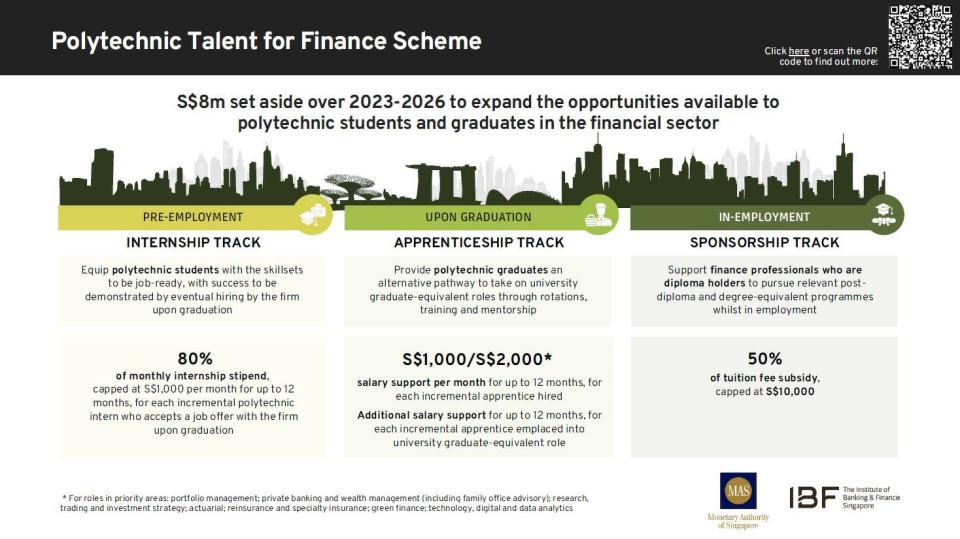MAS launches $8 million to tap polytechnic talent for financial industry

"Many of you are technically competent, good problem-solvers and operate well in an interdisciplinary environment"
In a bid to further grow and widen the talent pool for the local financial services sector, the Monetary Authority of Singapore will set aside $8 million over the next three years for the Polytechnic Talent for Finance scheme.
The scheme, which will be administered by the Institute of Banking & Finance (IBF), comprises three tracks.
First, internship opportunities for polytechnic students, to equip them with skillsets to be job-ready, and hired upon graduation. The scheme will fund 80% of monthly internship stipends, capped at $1,000 per month, for up to 12 months for qualifying interns.
Next, for polytechnic graduates, apprenticeships will be offered to provide them with an alternative pathway to secure good jobs immediately after obtaining their polytechnic diplomas, receive training and eventually take on university graduate-equivalent roles.
The scheme will provide salary support of up to $2,000 per month, for up to 12 months. For apprentices that are placed into university graduate-equivalent roles within three years from the start of the apprenticeship programme, the scheme will provide salary support for an additional period of up to 12 months.
Last but not least, for existing finance professionals who are diploma holders, there will be sponsorships to help them pursue relevant post-diploma and degree-equivalent programmes whilst continuing to be employed. The scheme will fund 50% of tuition fees, capped at $10,000.
“Our financial sector has been growing like a fast-growing tree,” says Alvin Tan, a board member of MAS.
“Financial institutions and FinTech companies need a strong pool of talent. One group they hope to attract is polytechnic graduates like yourselves,” says Tan, who is also Minister of State, Ministry of Culture, Community and Youth, and Ministry of Trade and Industry.
According to Tan, only 3% of polytechnic graduates who go into full-time permanent jobs upon graduation join the financial sector, even though financial sector jobs make up more than 5% of all jobs in the economy.
“Many of you are technically competent, good problem-solvers and operate well in an interdisciplinary environment, thanks to our polytechnics’ industry-oriented training that combines theory with hands-on experience and real-world application. So, you have much to contribute,” says Tan.
Similarly, Gillian Tan, Assistant Managing Director (Development and International), MAS, describes polytechnic graduates as a valuable talent pool for the financial sector.
The scheme “will enable our polytechnic talent to take up meaningful jobs and position them for success in financial sector careers.”
William Lim, Director, School of Business & Accountancy, Ngee Ann Polytechnic (NP) calls the scheme one that builds upon existing efforts to develop a sustainable pipeline of talent, as well as support upskilling and reskilling needs.
The school has been appointed Sector Coordinator for the Accountancy & Financial Services sector.
“Through this collaborative effort, we look forward to strengthening the industry-academia nexus and creating more opportunities for polytechnic students and graduates to pursue their professional development and careers with financial institutions,” he adds.

See Also:
Click here to stay updated with the Latest Business & Investment News in Singapore
MAS denies it has told private banks here to 'keep quiet' about origin of fund flows
Get in-depth insights from our expert contributors, and dive into financial and economic trends

 Yahoo Finance
Yahoo Finance 